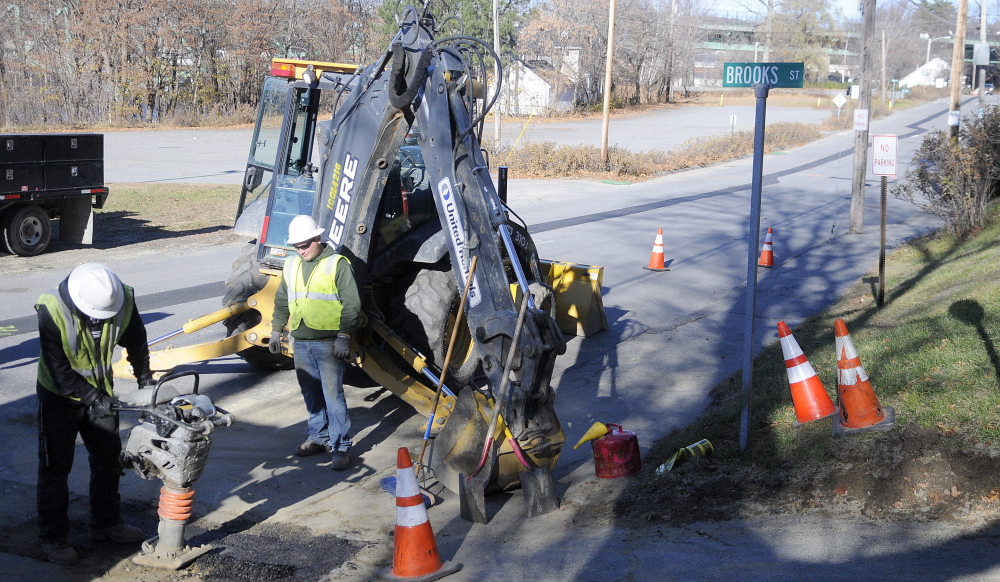Summit Natural Gas of Maine is on track to complete an equipment inspection and replacement process required by state regulators by an end-of-year deadline, according to documents filed with the Maine Public Utilities Commission.
This fall, the commission ordered Summit to inspect physically and replace hundreds of pipe couplings that had been installed incorrectly on its Kennebec valley gas distribution network.
The commission gave Summit until Dec. 31 to complete its inspection program or find alternate heating fuel for affected customers.
In a detailed 15-page notice of substantial completion filed with the commission on Tuesday, Summit stated it was on track to finish its work by the deadline and it was taking extra steps to address the problem.
“We’re just kind of giving them a heads up that the plan has gone as expected, we are at least 90 percent complete, and we are nearing the end,” Keith Lincoln, Summit’s operations manager, said in an interview Wednesday morning.
The extensive inspection and testing program the company conducted on its equipment also shows the company’s commitment to providing a safe and reliable natural gas system, Lincoln added.
The inspection program covered 588 electro fusion couplings installed incorrectly by three contractors — Tetra Tech, PES and a company identified only as “Contractor X” — during the company’s Kennebec valley build-out in 2013-14, and covered its network in the Augusta and Waterville areas. In its filing, Summit said that Contractor X is a pseudonym used because the terms of a settlement between Summit and the company prohibit Summit from making public references to it “that could be construed as negative.”
CCB Inc., a construction firm based in Westbrook, worked on the Kennebec valley pipeline and has been identified previously by the commission as having installed other pipeline fittings incorrectly.
According to the filing, the company so far has replaced 296 of the couplings and has 52 left to replace.
“I would say, percentagewise, it was about what we thought it was,” Lincoln said.
The inspections mostly did not interrupt service to customers, but in rare instances when it was necessary, service was resumed on the same day, according to company spokeswoman Lizzy Reinholt. The mild autumn helped the company complete the mitigation plan successfully, she added.
Problems with the couplings were discovered this summer as Summit was inspecting and replacing residential service connections called electro fusion tees that also were installed incorrectly by contractors working for the company. According to the terms of its voluntary mitigation plan, Summit agreed to find and visually inspect all the couplings installed in Augusta, Waterville, Fairfield, Gardiner, Hallowell, Madison and Randolph.
Additionally, Summit picked five couplings at random from each of the identified contractors and subjected them to destructive testing by a third party to make sure they met safety standards.
Two of the couplings installed by Tetra Tech that passed a visual inspection failed destructive testing, and as a result, Summit replaced all the couplings installed by the contractor. In its filing, Summit said the issue was the presence of dirt within the fusion interface. Summit said it believed the issue is a “systematic defect in Tetra Tech’s workmanship” because similar problems were found in electro fusion tees installed by the contractor.
Summit also sent samples to the Advanced Structures and Composites Center at the University of Maine for additional testing, and without exception, they “passed a rigorous battery of tests,” according to the filing.
The company initially did not know where all the couplings were installed because they were dispersed across the network and not necessarily marked, but its records indicated it had issued 640 couplings to the three contracts. It was finally able to identify and locate 92 percent of the installed couplings.
The outstanding couplings were “well within the expected contractor wastage,” Summit said in its filing. Examples of wastage included misplacing or losing 2 inch diameter couplings, or discarding couplings that did not fuse correctly.
In other cases, the three contractors might not have turned remaining couplings over to the company, Summit said.
“Given the tenor of the business relationship when it ended, those contractors lacked incentive to return all couplings to Summit,” the company said.
The filing lists additional steps the company will take to make sure the system is safe, including accelerated leak testing, maintaining a database of couplings found after the inspection program, and semi-annual reports to the commission on the issue through 2020.
“We wanted to document for the PUC the overall precautions we were taking to ensure the integrity and safety of the system,” Reinholt said.
Peter McGuire — 861-9239
Send questions/comments to the editors.



